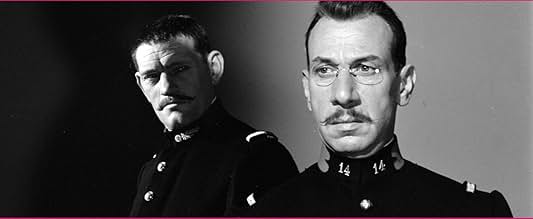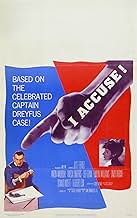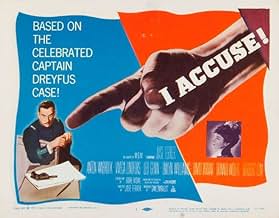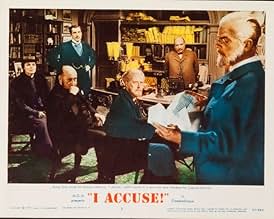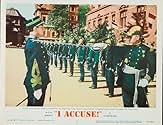Ajouter une intrigue dans votre langueIn 1894 France, a Jewish officer in the French Army is falsely accused of spying for Germany.In 1894 France, a Jewish officer in the French Army is falsely accused of spying for Germany.In 1894 France, a Jewish officer in the French Army is falsely accused of spying for Germany.
- Réalisation
- Scénario
- Casting principal
José Ferrer
- Captain Dreyfus
- (as Jose Ferrer)
Avis à la une
This film is based on the true story of Captain Dreyfus of the French Army who, based on weak evidence, is wrongly accused of treason. The film takes place over a seven year period beginning in 1894 Captain Dreyfus comes from a wealthy industrial family but because of love of his country, joins the military rather than help run the family business. His family are Jewish and originally come from an area of Germany. It is discovered that a spy within the officers assigned to a leading General is selling military secrets to foreign agents. Dreyfus is a dour, by-the-book, military Beauregard who has no friends within the command and because of his Jewish and German heritage the military makes him a scapegoat to the crime. Jose Ferrer stars and directs an international cast. Based on the book by Nicholas Halasz, I Accuse is adapted by novelist Gore Vidal in the 2nd screenplay of his career. Photographing this film is veteran cinematographer Freddie Young, whose career lasted 57 years and included three Oscars for Doctor Zhivago, Ryan's Daughter and Lawrence of Arabia. Vivica Lindfors, who was my 4th cousin, plays Dreryfus' wife Lucie. Also among the cast are Anton Walbrook, Donald Wolfit and Herbert Lom. Ferrer is kind of dry and one dimensional and plays the entire film with one emotion. There is not a lot for Lindfors to do. Several of the cast turn in fine performances in this film that was made to mirror the recent McCarthy era witch hunts. There are no closeups and the entire film uses heavy shadows in every scene, indoor and out. This film was remade with Richard Dreyfus who is said to be a family descendant of Captain Dreyfus in the starring role. It's a good historical drama but as a film it falls a little short. I would give it a 7.5 out of 10.
The most interesting characteristic of this film is its almost militarily disciplined restraint. It is all about the glory and honour of the military, and most of the actors are military officers. José Ferrer has directed this film focusing on military mentality and managing very well in bringing forth both the good sides of it and the worst, the unreasonableness of disciplinary rigour. The film is crowded with outstanding actors, like David Farrar as the brother, Felix Aylmer as the old lawyer, Herbert Lom as the relentless calligraphic expert, Anton Walbrook as a very suave and clever Esterhazy, and above all, the beautiful Viveca Lindfors as the wife. I had been searching for this film for years when it suddenly appeared on my menu, and although my expectations were the very highest, I was positively surprised. The best actor of all here is José Ferrer himself as the culprit, and although Captain Dreyfus has been brought on film many times, this must be the best interpretation of the character. The scenes of his trials on Devil's Island are heartbreaking without going to extremes, also here the director sticks to his very objective discipline. It is a most admirable treasure of a film, priceless and precious, while Emile Zola is a little played down. Well, he had his own film in 1938 with Paul Muni, in which film Dreyfus almost stole the entire show, so even Emile Zola has to conform here to the strict discipline of the impressingly military discipline of this extremely important film.
Jose Ferrer was indubitably intelligent and impeccably liberal, as he was sure to let you know. He made a number of rather good movies, but he was not as brilliant as he thought, and his lack of the conventional movie virtues such as charm, sex appeal, or just friendly warmth was far more damaging than he knew.
This movie presents the story clearly and fairly, and there are some good performances, but on the whole it's very cold and dry.
Gore Vidal's script is also intelligent and, rarely for Hollywood historical films, does not contain a single vulgarism or anachronism. But, again, a few of these would be a small price to pay for some zest and passion. A more surprising omission is wit, which one would have expected from Vidal.
And there is another omission. The Dreyfus case was an indication of the degree of anti-semitism among the French as a whole, not only the military. The hatred of Jews that the case provided an opportunity to express was so intense, widespread, and violent that many left the country. We are told at the beginning of the film that Dreyfus is a Jew, and a bit later there are a couple of mentions of the fact that most people do not like or trust them. But that's it. There is no sense at all of the vicious and hysterical feelings that were voiced by the ignorant public and whipped up by the media. The mobs have only a pathetic two or three placards, none of which mention Jews, and when they shout insults we do not hear the word. Ironically, this is a heavily censored movie about people who do not tell the truth.
As Dreyfus, Ferrer is very correct, proper, and unimaginative. After he is cruelly mistreated we see him suffer, but his pain is not has affecting as it should be--there is something actorish about it. The acting honors go to David Farrar as Dreyfus's brother and Leo Genn as his one supporter on the general staff--indeed, the latter looks so good in his full moustache and acts so suavely that we seem at times to be watching James Mason.
You really know the movie has failed when the person in whom we are most interested, and most anxious to see again, is Esterhazy, the real spy, who throws the innocent Dreyfus to the wolves. Anton Walbrook is so steeped in seedy charm, so much the would-be languorous fatalist with one eye nervously alert that we are keen to see someone with an active mind rather than another puppet in this story that is far more complex and unsavory than the film makes out.
Gore Vidal's script is also intelligent and, rarely for Hollywood historical films, does not contain a single vulgarism or anachronism. But, again, a few of these would be a small price to pay for some zest and passion. A more surprising omission is wit, which one would have expected from Vidal.
And there is another omission. The Dreyfus case was an indication of the degree of anti-semitism among the French as a whole, not only the military. The hatred of Jews that the case provided an opportunity to express was so intense, widespread, and violent that many left the country. We are told at the beginning of the film that Dreyfus is a Jew, and a bit later there are a couple of mentions of the fact that most people do not like or trust them. But that's it. There is no sense at all of the vicious and hysterical feelings that were voiced by the ignorant public and whipped up by the media. The mobs have only a pathetic two or three placards, none of which mention Jews, and when they shout insults we do not hear the word. Ironically, this is a heavily censored movie about people who do not tell the truth.
As Dreyfus, Ferrer is very correct, proper, and unimaginative. After he is cruelly mistreated we see him suffer, but his pain is not has affecting as it should be--there is something actorish about it. The acting honors go to David Farrar as Dreyfus's brother and Leo Genn as his one supporter on the general staff--indeed, the latter looks so good in his full moustache and acts so suavely that we seem at times to be watching James Mason.
You really know the movie has failed when the person in whom we are most interested, and most anxious to see again, is Esterhazy, the real spy, who throws the innocent Dreyfus to the wolves. Anton Walbrook is so steeped in seedy charm, so much the would-be languorous fatalist with one eye nervously alert that we are keen to see someone with an active mind rather than another puppet in this story that is far more complex and unsavory than the film makes out.
The issues raised by the terrible injustice inflicted upon Captain Alfred Dreyfus and Emile Zola's subsequent rallying cry 'J'accuse' in 'L'Aurore' of 1898 are timeless and have certainly struck a chord with film-makers, enabling many of them to draw parallels with their own times and experiences.
The final speech by Paul Muni as Zola in William Dieterle's excellent biopic is a veiled reference to the rise of Nazism although strangely, considering that Dreyfus was Jewish, no one utters the words 'Jew' or 'anti-Semitic'. Fast forward eighty odd years and we have a version by Roman Polanski for whom the Jewish element would have provided many painful memories. There are those who have seen in his film an allegory of the director's own perceived persecution by LA County! Yves Boisset's TV film reflects his cinematic crusade to depict institutionalised corruption whilst the Ken Russell/Richard Dreyfus version is just one too many. Mr. Dreyfus is advertising his liberal credentials here and claims to be a descendant of the unfortunate Captain. The fascination of the eleven minute series by Georges Melies stems from its being made whilst the Dreyfus affair was still raging. I have alas never seen Richard Oswald's version and would be interested to see how the Germans handled the subject.
This adaptation from 1958 is directed by and stars well-known liberal José Ferrer, is produced by Sam Zimbalist and has a screenplay by Gore Vidal. Hardly surprising therefore that there are distinct echoes here of the McCarthy witch hunts.
It is made in a very matter-of-fact manner and some of the leading characters are under-written but the emotive material and strong performances carry us through.
A contingent of dependable British thespians is on dispay here notably Leo Genn whose genteel persona suits perfectly the character of Major Picquart who campaigned tirelessly for Dreyfus' acquittal whilst the odious General Mercier of Donald Wolfit epitomises Oscar Wilde's observation that "patriotism is the virtue of the vicious." Equally obnoxious is Major du Paty played by the superlative Herbert Lom, sans peruke. The two performances that linger longest are those of Swedish born Viveca Lindfors who brings her customary intelligence and sensitivity to the role of Madame Dreyfus and the immaculate Austrian Anton Walbrook who effortlessly steals all of his scenes as the charming but despicable Major Esterhazy.
José Ferrer achieves the Herculean task of being both director and portraying Dreyfus. A previous reviewer, female naturally, has remarked upon Mr. Ferrer's lack of charisma and sex appeal. I was not aware that Dreyfus possessed either of those attributes or that Mr. Ferrer was ever called upon to play a role that required them. He is immensely sympathetic in the part and what he does possess is that golden voice.
The film proudly announces that Dreyfus' eventual acquittal and reinstatement represent a brave chapter in French history. This is of course absolute tosh for were it not for the bravery and determination of a few individuals, Dreyfus would have been left to rot on Devil's Island.
The final speech by Paul Muni as Zola in William Dieterle's excellent biopic is a veiled reference to the rise of Nazism although strangely, considering that Dreyfus was Jewish, no one utters the words 'Jew' or 'anti-Semitic'. Fast forward eighty odd years and we have a version by Roman Polanski for whom the Jewish element would have provided many painful memories. There are those who have seen in his film an allegory of the director's own perceived persecution by LA County! Yves Boisset's TV film reflects his cinematic crusade to depict institutionalised corruption whilst the Ken Russell/Richard Dreyfus version is just one too many. Mr. Dreyfus is advertising his liberal credentials here and claims to be a descendant of the unfortunate Captain. The fascination of the eleven minute series by Georges Melies stems from its being made whilst the Dreyfus affair was still raging. I have alas never seen Richard Oswald's version and would be interested to see how the Germans handled the subject.
This adaptation from 1958 is directed by and stars well-known liberal José Ferrer, is produced by Sam Zimbalist and has a screenplay by Gore Vidal. Hardly surprising therefore that there are distinct echoes here of the McCarthy witch hunts.
It is made in a very matter-of-fact manner and some of the leading characters are under-written but the emotive material and strong performances carry us through.
A contingent of dependable British thespians is on dispay here notably Leo Genn whose genteel persona suits perfectly the character of Major Picquart who campaigned tirelessly for Dreyfus' acquittal whilst the odious General Mercier of Donald Wolfit epitomises Oscar Wilde's observation that "patriotism is the virtue of the vicious." Equally obnoxious is Major du Paty played by the superlative Herbert Lom, sans peruke. The two performances that linger longest are those of Swedish born Viveca Lindfors who brings her customary intelligence and sensitivity to the role of Madame Dreyfus and the immaculate Austrian Anton Walbrook who effortlessly steals all of his scenes as the charming but despicable Major Esterhazy.
José Ferrer achieves the Herculean task of being both director and portraying Dreyfus. A previous reviewer, female naturally, has remarked upon Mr. Ferrer's lack of charisma and sex appeal. I was not aware that Dreyfus possessed either of those attributes or that Mr. Ferrer was ever called upon to play a role that required them. He is immensely sympathetic in the part and what he does possess is that golden voice.
The film proudly announces that Dreyfus' eventual acquittal and reinstatement represent a brave chapter in French history. This is of course absolute tosh for were it not for the bravery and determination of a few individuals, Dreyfus would have been left to rot on Devil's Island.
Great story for then and now about politics and false accusation. Acting was great. Movies from 30's 40's and some 50's are of great quality. Well written and filmed. You will enjoy. Reminds me of Les Misérables. But seems more real like in the story.
Le saviez-vous
- AnecdotesThis movie was not shot in widescreen. It was converted to CinemaScope in the final print after having been shot in standard Academy ratio, much like some movies, which are "matted" after having been shot in Academy ratio. The process used was contemporary of SuperScope and a forerunner of Super 35. It was filmed using spherical lenses at an aspect ratio of 1.37:1. In the printing process, the images were cropped to a height of two perforations, giving them an aspect ratio of 2.36:1. The images were then stretched vertically to a height of four perforations, at which point they conformed to the standard CinemaScope-2 format.
- Citations
Émile Zola: This Esterhazy is one of the most glorious liars that ever drew breath. Why, the authority of it, the poise; the man's a genius!
- Crédits fous[Scrolling Prologue] In 1894 Alfred Dreyfus, a French Army officer, stood before a military tribunal accused of treason. The outcome of this trial, a trial that created an international sensation, is a brave chapter in the history of France, that nation which first proclaimed the Rights of Man.
Meilleurs choix
Connectez-vous pour évaluer et suivre la liste de favoris afin de recevoir des recommandations personnalisées
- How long is I Accuse!?Alimenté par Alexa
Détails
Box-office
- Budget
- 1 800 000 $US (estimé)
- Durée1 heure 39 minutes
- Couleur
- Mixage
- Rapport de forme
- 2.35 : 1
Contribuer à cette page
Suggérer une modification ou ajouter du contenu manquant


